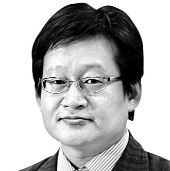Lessons from Gates
이 글자크기로 변경됩니다.
(예시) 가장 빠른 뉴스가 있고 다양한 정보, 쌍방향 소통이 숨쉬는 다음뉴스를 만나보세요. 다음뉴스는 국내외 주요이슈와 실시간 속보, 문화생활 및 다양한 분야의 뉴스를 입체적으로 전달하고 있습니다.

Suh Kyoung-ho The author is economic and industry news director of the JoongAng Ilbo.
“All lives have equal value” is the motto of the Bill and Melinda Gates Foundation. “We are impatient optimists working to reduce inequity,” its website says. The foundation is the world’s biggest charity, managing nearly $5 billion with 1,600 people on its payroll.
A three-part Netflix documentary, “Inside Bill’s Brain: Decoding Bill Gates,” touched on the software magnate’s life from childhood through his days at Microsoft to the foundation he co-manages with his wife. It is mostly devoted to charity work.
Why is the world’s richest man so keen on improving public toilets in poor countries where children die from poor hygiene as well as spreading vaccines to relieve African children from polio threats? His reason is simple: The life of a child in Africa is as important as one anywhere.
Despite its grave seriousness, the documentary does not bore due to the personality of the former IT guru. Hamburger is his favorite food. He skips breakfast and meticulously keeps meeting times. Although superrich, Gates too cannot buy time. He strolls as much as he can to get his thoughts in order. Having a “think week” was a habit from his Microsoft years. He carries off to his cabin a bag full of books for time to read.
How he has changed his notorious reputation as the devil of Silicon Valley to become one of the most active philanthropists in the world since he started the foundation in 2006 is impressive. He is media friendly and preaches about the problems and challenges around the world. His charity is not just aimed at helping the poor. He proposes effective solution — distribution of vaccines and technologies in underdeveloped countries to raise livelihoods and productivity standards. He applies entrepreneurship to philanthropy by focusing on healthcare, hygiene, education and climate change and investing in ventures devoted to social themes.
The Gates shared their favorite quote from billionaire-investor Warrant Buffet, who has been following up on his pledge of $30 billion to the foundation by putting up $1.3 billion to $2.7 billion a year, urging them to “swing for the fences.” In baseball, that signifies that a batter is putting all his strength into hitting the ball as far as possible, even at the risk of missing the ball.
The goal of philanthropy is not just incremental progress, but the big bets behind efforts that will save and change lives as a result. Placing big bets where governments and businesses cannot is the key to ambitious charities aiming for breakthroughs for mankind, Gates reason.
Kim Beom-su, KakaoTalk founder and chairman of Kakao, pledged half his wealth — about $5 billion — to help address social inequalities. Kim often quotes a poem by Ralph Waldo Emerson “What is Success?” It is to “leave the world a bit better, whether by a healthy child, a garden patch or a redeemed social condition” and to “know even one life has breathed easier because you have lived.”
Nuclear reactors are another passion of Gates as he has demonstrated in his book “How to Avoid a Climate Disaster,” which was published last week. He advocates for nuclear fuel to bring down 51 billion tons of carbon emissions around the world to zero by 2050.
Gates’ solution to achieve climate neutrality comes as officials from the Industry and Energy Ministry in Korea face trials for breaking laws to comply with an order from above to meet President Moon Jae-in’s campaign promise to phase out nuclear reactors.
Gates has long championed nuclear power for energy sourcing. He founded TerraPower in 2016 to spread nuclear energy as a future energy infrastructure. In the Netflix documentary, Gates reasoned why nuclear reactors are safer in generating power than fossil-fueled plants and praises new reactor technology based on advanced designs.
In an interview with the Washington Post after releasing his book, Gates argued there were only three solutions to make electricity “cheap and reliable”: One is a miracle in grid storage batteries and the remaining two options are nuclear fission and fusion.
A nuclear phase-out was one of 100 promises the Moon Jae-in government announced in July 2017. In October, the agenda was tweaked to an “energy shift” and has since not been mentioned as a “nuclear phase-out.” But the central idea of phasing out nuclear power remains intact.
Research on nuclear technology has stopped. Even Gates would have been under attack if he had been in Korea.
Copyright © 코리아중앙데일리. 무단전재 및 재배포 금지.